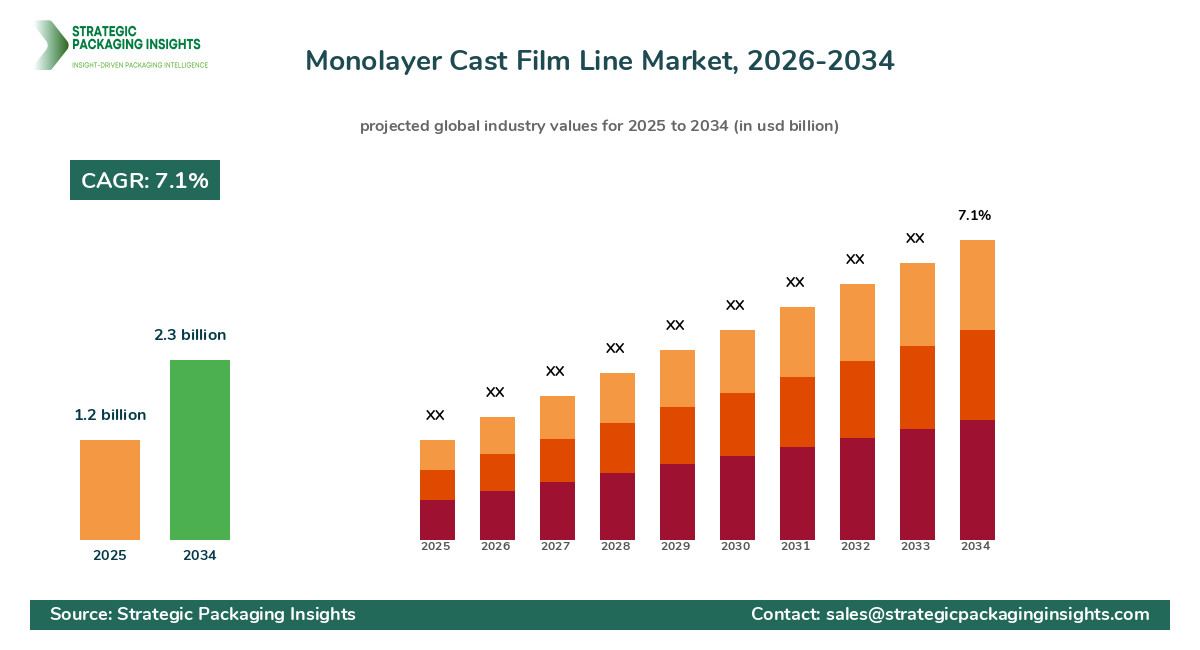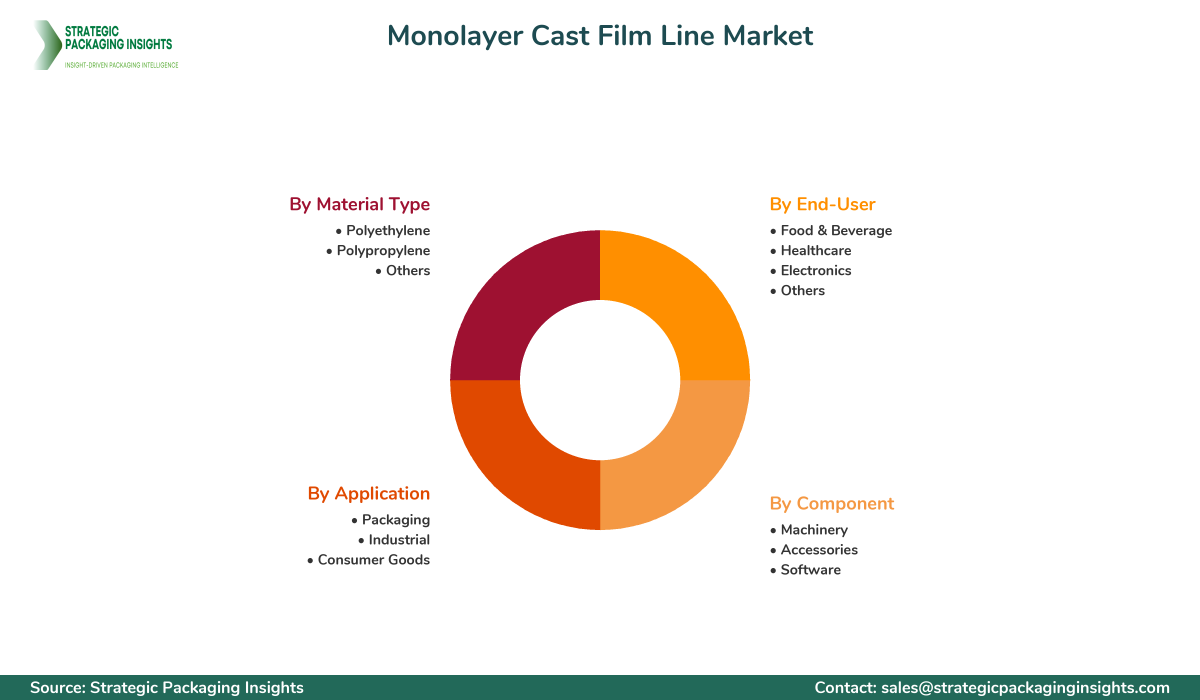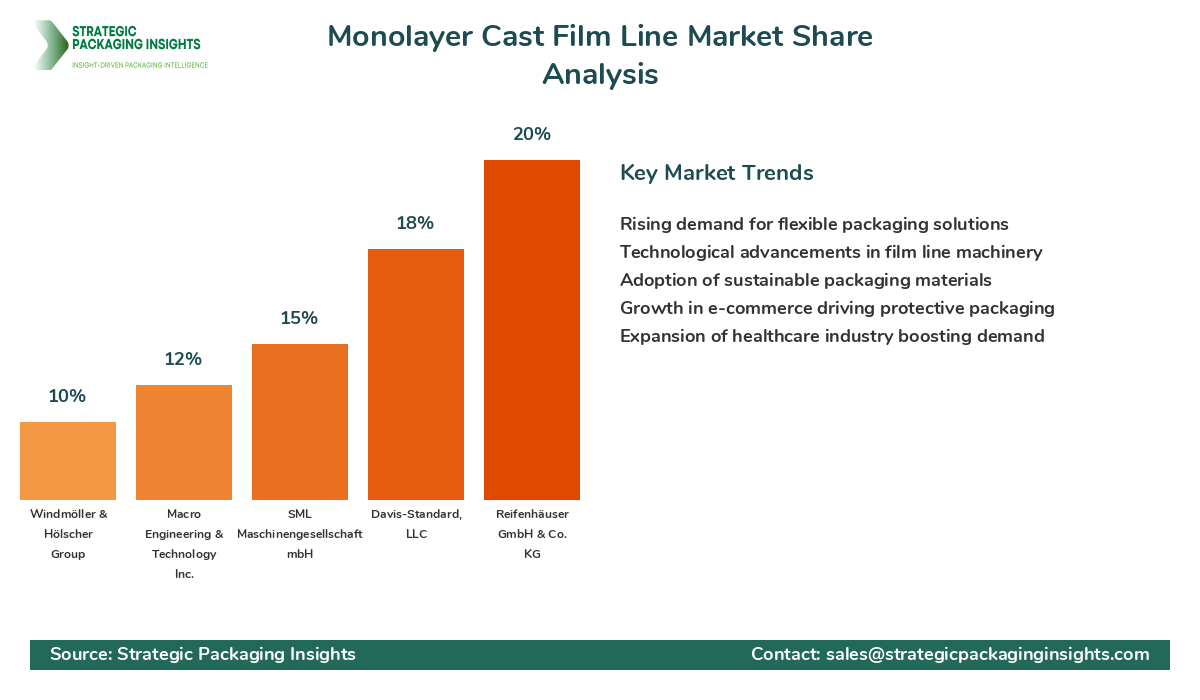- Home
- Advanced Packaging
- Monolayer Cast Film Line Market Size, Future Growth and Forecast 2033
Monolayer Cast Film Line Market Size, Future Growth and Forecast 2033
Monolayer Cast Film Line Market Segments - by Component (Machinery, Accessories, Software), Application (Packaging, Industrial, Consumer Goods), Material Type (Polyethylene, Polypropylene, Others), End-User (Food & Beverage, Healthcare, Electronics, Others) - Market Dynamics, Growth Opportunities, Strategic Drivers, and PESTLE Outlook (2025–2033)
Monolayer Cast Film Line Market Outlook
The Monolayer Cast Film Line market was valued at $1.2 billion in 2024 and is projected to reach $2.3 billion by 2033, growing at a CAGR of 7.1% during the forecast period 2025-2033. This market is witnessing significant growth due to the increasing demand for flexible packaging solutions across various industries such as food and beverage, healthcare, and consumer goods. The rise in e-commerce and the need for efficient packaging solutions to ensure product safety and shelf life are driving the demand for monolayer cast film lines. Additionally, advancements in technology and the development of innovative materials are further propelling market growth.
Report Scope
| Attributes | Details |
| Report Title | Monolayer Cast Film Line Market Size, Future Growth and Forecast 2033 |
| Base Year | 2025 |
| Historic Data | 2018-2024 |
| Forecast Period | 2026-2034 |
| Number of Pages | 145 |
| Component | Machinery, Accessories, Software |
| Application | Packaging, Industrial, Consumer Goods |
| Material Type | Polyethylene, Polypropylene, Others |
| End-User | Food & Beverage, Healthcare, Electronics, Others |
| Customization Available | Yes* |
Key Highlights Monolayer Cast Film Line Market

- Increasing demand for flexible packaging solutions in the food and beverage industry.
- Technological advancements in film line machinery enhancing production efficiency.
- Rising adoption of sustainable and eco-friendly packaging materials.
- Growing e-commerce sector driving the need for protective packaging solutions.
- Expansion of healthcare industry boosting demand for sterile packaging.
- Innovations in material science leading to the development of high-performance films.
- Strategic collaborations and partnerships among key players to enhance market presence.
- Regulatory support for sustainable packaging solutions encouraging market growth.
- Increasing investments in R&D for product innovation and development.
- Emergence of new market players intensifying competition.
Competitive Intelligence
The Monolayer Cast Film Line market is highly competitive, with several key players striving to enhance their market share through strategic initiatives. Companies such as Reifenhäuser GmbH & Co. KG, Davis-Standard, LLC, and SML Maschinengesellschaft mbH are leading the market with their extensive product portfolios and strong global presence. Reifenhäuser GmbH & Co. KG, for instance, is known for its innovative solutions and has a significant market share due to its focus on R&D and customer-centric approach. Davis-Standard, LLC, with its robust distribution network and diverse product offerings, is also a prominent player in the market. SML Maschinengesellschaft mbH is gaining ground with its advanced machinery and focus on sustainability. These companies are continuously investing in technology upgrades and expanding their geographic reach to maintain a competitive edge. However, the market also sees emerging players like Macro Engineering & Technology Inc. and Windmöller & Hölscher Group, who are rapidly gaining traction by offering cost-effective and efficient solutions. The competitive landscape is characterized by a mix of established players and new entrants, each vying for a larger share of the market.
Regional Market Intelligence of Monolayer Cast Film Line
Globally, the Monolayer Cast Film Line market is segmented into major regions such as North America, Europe, Asia-Pacific, Latin America, and the Middle East & Africa. North America holds a significant market share, valued at $400 million in 2024, and is expected to grow steadily due to the strong presence of key players and high demand for advanced packaging solutions. Europe, with a market size of $350 million, is driven by stringent regulations promoting Sustainable Packaging and the presence of leading manufacturers. The Asia-Pacific region, valued at $450 million, is the fastest-growing market, with a CAGR of 15%, fueled by rapid industrialization, urbanization, and increasing consumer demand for packaged goods. Latin America and the Middle East & Africa, with market sizes of $150 million and $100 million respectively, are also witnessing growth due to expanding food and beverage industries and rising investments in packaging infrastructure.
Top Countries Insights in Monolayer Cast Film Line
In the Monolayer Cast Film Line market, the United States leads with a market size of $300 million and a CAGR of 8%, driven by technological advancements and high demand for flexible packaging. China, with a market value of $250 million and a CAGR of 12%, is experiencing growth due to rapid industrialization and increasing consumer demand. Germany, valued at $200 million with a CAGR of 7%, benefits from strong manufacturing capabilities and a focus on sustainable packaging solutions. India, with a market size of $150 million and a CAGR of 10%, is witnessing growth due to rising e-commerce and consumer goods sectors. Brazil, with a market value of $100 million and a CAGR of 6%, is driven by the expanding food and beverage industry and increasing investments in packaging technology.
Monolayer Cast Film Line Market Segments Insights

Component Analysis
The component segment of the Monolayer Cast Film Line market is divided into machinery, accessories, and software. The machinery segment dominates the market due to the high demand for advanced and efficient film line machines that enhance production capabilities. Companies are focusing on developing machinery with improved automation and precision to meet the growing demand for high-quality films. The accessories segment is also witnessing growth as manufacturers seek to enhance the functionality and efficiency of their film lines. Software solutions are becoming increasingly important as they enable better control and monitoring of the production process, leading to improved efficiency and reduced waste.
Application Analysis
The application segment includes packaging, industrial, and consumer goods. The packaging segment holds the largest market share, driven by the increasing demand for flexible and sustainable packaging solutions across various industries. The industrial segment is also growing as manufacturers seek durable and high-performance films for various applications. The consumer goods segment is witnessing growth due to the rising demand for packaged products and the need for attractive and protective packaging solutions.
Material Type Analysis
The material type segment is categorized into polyethylene, polypropylene, and others. Polyethylene is the most widely used material due to its versatility, durability, and cost-effectiveness. It is preferred for a wide range of applications, including food packaging and industrial films. Polypropylene is gaining popularity due to its superior clarity and strength, making it ideal for applications requiring high-quality visual appeal. Other materials, such as biodegradable and compostable films, are also gaining traction as companies focus on sustainability and eco-friendly solutions.
End-User Analysis
The end-user segment includes food & beverage, healthcare, electronics, and others. The food & beverage industry is the largest end-user of monolayer cast film lines, driven by the need for efficient and protective packaging solutions to ensure product safety and shelf life. The healthcare sector is also a significant end-user, with a growing demand for sterile and secure packaging solutions. The electronics industry is witnessing growth as manufacturers seek high-performance films for protective and functional packaging applications.
The market share distribution in the Monolayer Cast Film Line market is characterized by a few dominant players and several smaller companies. Reifenhäuser GmbH & Co. KG and Davis-Standard, LLC are leading the market with significant shares due to their extensive product offerings and strong global presence. SML Maschinengesellschaft mbH is also a key player, gaining market share with its focus on innovation and sustainability. The competitive positioning of these companies is influenced by their ability to offer advanced and efficient solutions, which in turn affects pricing strategies and partnerships. Emerging players are challenging the established companies by offering cost-effective solutions and targeting niche markets. This dynamic market share distribution is driving innovation and strategic collaborations among key players.
Monolayer Cast Film Line Market Segments
The Monolayer Cast Film Line market has been segmented on the basis of
Component
- Machinery
- Accessories
- Software
Application
- Packaging
- Industrial
- Consumer Goods
Material Type
- Polyethylene
- Polypropylene
- Others
End-User
- Food & Beverage
- Healthcare
- Electronics
- Others
Primary Interview Insights
What are the key drivers for the Monolayer Cast Film Line market?
How is the competitive landscape evolving in this market?
Which regions are expected to see the most growth?
What challenges does the market face?
What role does technology play in this market?
Latest Reports

The pallet wrapping packaging market was valued at $8.5 billion in 2024 and is projected to reach $12.3 billion by 2033, growing at a CAGR of 4.2% during the forecast period 2025–2033.

The stretch film packaging market was valued at $12.5 billion in 2024 and is projected to reach $20.3 billion by 2033, growing at a CAGR of 5.5% during the forecast period 2025–2033.

The shrink film packaging market was valued at $4.5 billion in 2024 and is projected to reach $7.8 billion by 2033, growing at a CAGR of 6.2% during the forecast period 2025–2033.

The connected packaging market was valued at $31.2 billion in 2024 and is projected to reach $82.1 billion by 2033, growing at a CAGR of 11.2% during the forecast period 2025–2033.

The active packaging market was valued at $18.5 billion in 2024 and is projected to reach $31.2 billion by 2033, growing at a CAGR of 6.2% during the forecast period 2025–2033.

The Intelligent Packaging market was valued at $18.5 billion in 2024 and is projected to reach $31.2 billion by 2033, growing at a CAGR of 6.2% during the forecast period 2025–2033.

The IoT-Enabled Packaging market was valued at $12.5 billion in 2024 and is projected to reach $35.7 billion by 2033, growing at a CAGR of 12.3% during the forecast period 2025–2033.

The NFC Packaging market was valued at $12.5 billion in 2024 and is projected to reach $35.7 billion by 2033, growing at a CAGR of 12.3% during the forecast period 2025–2033.

The RFID Packaging market was valued at $12.5 billion in 2024 and is projected to reach $28.7 billion by 2033, growing at a CAGR of 9.5% during the forecast period 2025–2033.

The sensor-enabled packaging market was valued at $18.5 billion in 2024 and is projected to reach $45.3 billion by 2033, growing at a CAGR of 10.5% during the forecast period 2025–2033.

The Temperature-Indicating Packaging market was valued at $1.2 billion in 2024 and is projected to reach $2.8 billion by 2033, growing at a CAGR of 9.5% during the forecast period 2025–2033.

The Time-Temperature Indicator (TTI) Packaging market was valued at $1.2 billion in 2024 and is projected to reach $2.5 billion by 2033, growing at a CAGR of 8.5% during the forecast period 2025–2033.

The Anti-Microbial Packaging market was valued at $10.5 billion in 2024 and is projected to reach $18.7 billion by 2033, growing at a CAGR of 6.5% during the forecast period 2025–2033.

The Oxygen Scavenger Packaging market was valued at $1.8 billion in 2024 and is projected to reach $3.2 billion by 2033, growing at a CAGR of 6.5% during the forecast period 2025–2033.

The moisture absorber packaging market was valued at $1.2 billion in 2024 and is projected to reach $2.5 billion by 2033, growing at a CAGR of 8.5% during the forecast period 2025–2033.

The Ethylene Absorber Packaging market was valued at $1.2 billion in 2024 and is projected to reach $2.5 billion by 2033, growing at a CAGR of 8.5% during the forecast period 2025–2033.

The Spoilage Indicator Packaging market was valued at $1.2 billion in 2024 and is projected to reach $2.5 billion by 2033, growing at a CAGR of 8.5% during the forecast period 2025–2033.

The Tamper-Aware Smart Packaging market was valued at $2.5 billion in 2024 and is projected to reach $6.8 billion by 2033, growing at a CAGR of 11.5% during the forecast period 2025–2033.

The connected beverage packaging market was valued at $1.2 billion in 2024 and is projected to reach $3.5 billion by 2033, growing at a CAGR of 12.5% during the forecast period 2025–2033.

The QR-Code Packaging market was valued at $3.5 billion in 2024 and is projected to reach $9.8 billion by 2033, growing at a CAGR of 12.5% during the forecast period 2025–2033.

The AR-Enabled Packaging market was valued at $2.5 billion in 2024 and is projected to reach $12.8 billion by 2033, growing at a CAGR of 20.1% during the forecast period 2025–2033.

The Digital Printing Smart Packaging market was valued at $15.2 billion in 2024 and is projected to reach $28.7 billion by 2033, growing at a CAGR of 7.1% during the forecast period 2025–2033.

The blockchain-enabled packaging market was valued at $1.2 billion in 2024 and is projected to reach $5.8 billion by 2033, growing at a CAGR of 19.5% during the forecast period 2025–2033.

The Supply Chain Traceable Packaging market was valued at $12.5 billion in 2024 and is projected to reach $25.8 billion by 2033, growing at a CAGR of 8.2% during the forecast period 2025–2033.

The counterfeit protection packaging market was valued at $89 billion in 2024 and is projected to reach $145 billion by 2033, growing at a CAGR of 5.5% during the forecast period 2025–2033.

The pallet wrapping packaging market was valued at $8.5 billion in 2024 and is projected to reach $12.3 billion by 2033, growing at a CAGR of 4.2% during the forecast period 2025–2033.

The stretch film packaging market was valued at $12.5 billion in 2024 and is projected to reach $20.3 billion by 2033, growing at a CAGR of 5.5% during the forecast period 2025–2033.

The shrink film packaging market was valued at $4.5 billion in 2024 and is projected to reach $7.8 billion by 2033, growing at a CAGR of 6.2% during the forecast period 2025–2033.

The connected packaging market was valued at $31.2 billion in 2024 and is projected to reach $82.1 billion by 2033, growing at a CAGR of 11.2% during the forecast period 2025–2033.

The active packaging market was valued at $18.5 billion in 2024 and is projected to reach $31.2 billion by 2033, growing at a CAGR of 6.2% during the forecast period 2025–2033.

The Intelligent Packaging market was valued at $18.5 billion in 2024 and is projected to reach $31.2 billion by 2033, growing at a CAGR of 6.2% during the forecast period 2025–2033.

The IoT-Enabled Packaging market was valued at $12.5 billion in 2024 and is projected to reach $35.7 billion by 2033, growing at a CAGR of 12.3% during the forecast period 2025–2033.

The NFC Packaging market was valued at $12.5 billion in 2024 and is projected to reach $35.7 billion by 2033, growing at a CAGR of 12.3% during the forecast period 2025–2033.

The RFID Packaging market was valued at $12.5 billion in 2024 and is projected to reach $28.7 billion by 2033, growing at a CAGR of 9.5% during the forecast period 2025–2033.

The sensor-enabled packaging market was valued at $18.5 billion in 2024 and is projected to reach $45.3 billion by 2033, growing at a CAGR of 10.5% during the forecast period 2025–2033.

The Temperature-Indicating Packaging market was valued at $1.2 billion in 2024 and is projected to reach $2.8 billion by 2033, growing at a CAGR of 9.5% during the forecast period 2025–2033.

The Time-Temperature Indicator (TTI) Packaging market was valued at $1.2 billion in 2024 and is projected to reach $2.5 billion by 2033, growing at a CAGR of 8.5% during the forecast period 2025–2033.

The Anti-Microbial Packaging market was valued at $10.5 billion in 2024 and is projected to reach $18.7 billion by 2033, growing at a CAGR of 6.5% during the forecast period 2025–2033.

The Oxygen Scavenger Packaging market was valued at $1.8 billion in 2024 and is projected to reach $3.2 billion by 2033, growing at a CAGR of 6.5% during the forecast period 2025–2033.

The moisture absorber packaging market was valued at $1.2 billion in 2024 and is projected to reach $2.5 billion by 2033, growing at a CAGR of 8.5% during the forecast period 2025–2033.

The Ethylene Absorber Packaging market was valued at $1.2 billion in 2024 and is projected to reach $2.5 billion by 2033, growing at a CAGR of 8.5% during the forecast period 2025–2033.

The Spoilage Indicator Packaging market was valued at $1.2 billion in 2024 and is projected to reach $2.5 billion by 2033, growing at a CAGR of 8.5% during the forecast period 2025–2033.

The Tamper-Aware Smart Packaging market was valued at $2.5 billion in 2024 and is projected to reach $6.8 billion by 2033, growing at a CAGR of 11.5% during the forecast period 2025–2033.

The connected beverage packaging market was valued at $1.2 billion in 2024 and is projected to reach $3.5 billion by 2033, growing at a CAGR of 12.5% during the forecast period 2025–2033.

The QR-Code Packaging market was valued at $3.5 billion in 2024 and is projected to reach $9.8 billion by 2033, growing at a CAGR of 12.5% during the forecast period 2025–2033.

The AR-Enabled Packaging market was valued at $2.5 billion in 2024 and is projected to reach $12.8 billion by 2033, growing at a CAGR of 20.1% during the forecast period 2025–2033.

The Digital Printing Smart Packaging market was valued at $15.2 billion in 2024 and is projected to reach $28.7 billion by 2033, growing at a CAGR of 7.1% during the forecast period 2025–2033.

The blockchain-enabled packaging market was valued at $1.2 billion in 2024 and is projected to reach $5.8 billion by 2033, growing at a CAGR of 19.5% during the forecast period 2025–2033.

The Supply Chain Traceable Packaging market was valued at $12.5 billion in 2024 and is projected to reach $25.8 billion by 2033, growing at a CAGR of 8.2% during the forecast period 2025–2033.

The counterfeit protection packaging market was valued at $89 billion in 2024 and is projected to reach $145 billion by 2033, growing at a CAGR of 5.5% during the forecast period 2025–2033.
